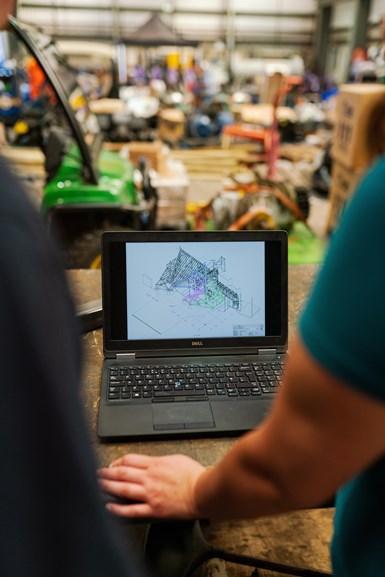How Transparency Can Help Machine Shops Become More Efficient
Here are three areas that a machine shop owner can use to both share information and gather new information that would help them become more efficient and effective.
Share






Hwacheon Machinery America, Inc.
Featured Content
View More
Takumi USA
Featured Content
View More


Machine shop owners have not always been known for being transparent. We believe in holding our cards close to the chest. It would be crazy to share what we have taken the time to perfect, wouldn’t it? Why should we let others benefit from our hard work, committing to the ups and downs of industry and business ownership?
Why? Because it’s the way we’ve always done it, of course.
How’s that working for us?
Small machine shops would do themselves – individually and as a community – a favor by being more transparent with our industry and peers.
There are three key areas of low-hanging fruit that any machine shop owner can use to both share information and gather new information that would help us become more efficient and effective:
ERP & Shop Floor Technology
The idea that 70% of all ERP implementations fail is terrifying and can often deter someone from changing ERP simply to avoid the risk. But what is being risked by keeping something that doesn’t work?
Reach out to fellow machine shops and ask what they use and how they like their ERP. Ask if they have swapped recently and see what advice they will give you for your own implementation. You may be surprised by what information they share. If you are on the other side of the coin - Have you gotten a phone call from a peer about a recent ERP implementation of your own? Check with your current ERP vendor. They may offer you a referral incentive.
Win-Tech was approached by a start-up ERP several months ago. While changing ERPs is not in the cards for the short-term, it may be in the longer term. For that reason, we asked to stay in touch with the company and offered to provide some insight into the challenges we are having with our current ERP. It can be empowering to think that some lessons learned could improve the way machine shops capture data in next-generation applications. If more ERPs sought and took the advice of today’s small machine shops, think of the potential options that would be available to us!
Sharing technology insights doesn’t stop at ERPs.
There are plenty of opportunities for implementing new technology on the shop floor. I am not advocating for a business owner to share his or her secrets of success, but rather some tips they can offer a peer who may return the favor tomorrow.
Be willing to share with peers how you use technology in your processes. You may help someone avoid recreating the wheel, and they will remember you for it, likely being more comfortable sharing helpful information or insights on something else in return.
Developing the Workforce
Get involved in your local public school system and trade school, representing your industry and marketing your industry (and company) to as many educational institutions as possible. Invite your competitors.
Address the elephant in the room when you invite them: The manufacturing industry is fighting for a limited group of qualified machinists. The pie is only so big.
But what if that pie was bigger? We need to work together and push our local school systems and governments harder to support this industry. It is easy to ignore one or two small machine shops, but not so easy as the snowball grows.
What if being quiet is preventing the next generation from seeing manufacturing as a potential career?
Working with other machine shops can not only amplify manufacturing as a vital piece of your community’s economic development, but it can help to showcase your business and help others gain awareness of available careers and jobs.
Customer Transparency
I have had conversations with my peers about the bare minimum they share with their customers. They answer supplier surveys when required, and tell customers whether or not their orders are on schedule as planned.
In these conversations, trying to hold back information is not the intent, but rather, providing the simplest, quickest update to a customer has been paramount.
I believe we do our customers a disservice if this continues to be our mindset.
Rather than tell us a customer that they will see parts in six weeks after you quoted four weeks just yesterday, explain the why.
“I had a machine go down, and our management team is prioritizing a workaround. How many parts do you need to meet immediate need?”
If our customers have more insight into what is driving a shortage or unplanned delay, they can often make updates on their side to lessen the overall program impact.
Bad news stinks, but transparency helps them to prepare.
It can be tough changing a long-standing mindset, but if it’s not working, what’s the harm in trying something new?
Read Next
Registration Now Open for the Precision Machining Technology Show (PMTS) 2025
The precision machining industry’s premier event returns to Cleveland, OH, April 1-3.
Read MoreSetting Up the Building Blocks for a Digital Factory
Woodward Inc. spent over a year developing an API to connect machines to its digital factory. Caron Engineering’s MiConnect has cut most of this process while also granting the shop greater access to machine information.
Read MoreBuilding Out a Foundation for Student Machinists
Autodesk and Haas have teamed up to produce an introductory course for students that covers the basics of CAD, CAM and CNC while providing them with a portfolio part.
Read More

































.jpg;maxWidth=300;quality=90)





